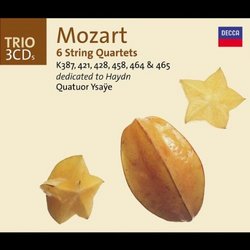| All Artists: Wolfgang Amadeus Mozart Title: Mozart: 6 Strings Quartets Members Wishing: 0 Total Copies: 0 Label: Umvd Labels Release Date: 8/12/2003 Album Type: Box set Genre: Classical Styles: Chamber Music, Historical Periods, Classical (c.1770-1830) Number of Discs: 3 SwapaCD Credits: 3 UPC: 028947396321 |
Search - Wolfgang Amadeus Mozart :: Mozart: 6 Strings Quartets
CD Details |
CD ReviewsSuperb performances of some of the greatest chamber music ev John Grabowski | USA | 01/14/2009 (5 out of 5 stars) "Someone once said that Mozart wrote the best string quartet music while Beethoven wrote the best music *for* string quartet. Listening to these works, which are the Austrian composer's peak in the genre, it's not hard to understand the meaning of that comment. Beethoven bent the genre to his liking--if something did not fit, he made it fit by sheer will. Mozart, on the other hand, never pushed the boundaries of the string quartet as much as he polished the extant elements to the highest gloss possible. It's no wonder mentor Haydn was bowled over by these works, even if the far-in-advance-of-its-time "Dissonant" K.465 gave him pause. (I believe, if memory serves, he finally said something like: "If Mozart wrote it, it must be correct," although I don't think he was ever fully on board.) And contrary to the myth perpetrated by Amadeus and other populist takes on Mozart, Wolfgang really did sweat over and revise many of his works, and these were among those that received many treatments. He wanted to impress the elder statesman, it's clear. What's interesting to consider is that at the time they were premiered, there were probably only two people who really understood them--and both were in that room: Mozart and Haydn. Maybe Leopold M. also had an indication of their genius--it's hard to tell how fully he grasped his son's achievements.
These effortless-sounding performances by Quartor Ysaye are simply some of the most natural, easy and joyous examples of Team Music-making I've ever heard on record. These are very straight-on performances, yet deeply felt; they aren't glib or bland, but they are without eccentricity or mannerism. The four musicians here interact with each other as though each one were telepathic. What plays a large part in their success, I think, is balance--and the *ringing* sonorities they achieve when they hold notes. For just one example among many, listen to the cello's pedal point at the end of a phrase in the slow movement of the first quartet in G minor, at 5:47 into the movement. In case you miss it it happens again at 6:18. Or, for another example, take the Quartet in E-flat, K. 428, which may be my favorite performance in the box: listen to the opening phrase of the first movement (a single short opening motif--you *know* he was writing these for Haydn's ear!): such *clarity* among the instruments. You can "hear into" the ringing chords the way you gaze into a crystal-clear pond, but it never sounds calculated, and the enthusiasm of the musicians bubbles over. The result makes you realize why string quartet-playing is among the most technically-demanding music-making in the world, however. This kind of sensuous attention to sound belies the myth that German string quartets are dry, studious exercises and that you have to turn to the French composers to have any fun--although I can also highly recommend this group's recording of the Debussy and Ravel quartets. The Ysaye is also one of those rare string ensembles were the viola doesn't either sound like it's fighting to be heard; overpowered by its brighter and deeper cousins. The result makes you realize how *beautifully balanced* these works are, and how Mozart could write for a pleasing balance to the ear like so few composers before or since. (Another example of that is the thunderous D minor chord that announces the Commendatore in Don Giovanni. It makes one's hair stand up, but it's not shrill or ugly.) The musicians benefit from very beautiful recorded sound--lush without being saccharine, big without squashing the classical elements. No, these musicians do not observe all the sacred principles of HIP, but that isn't their intention. They play these works stylishly and with deep and natural feeling, with an easy give-and-take that draws attention to the music rather than the soloists themselves--an ensemble in the best sense of the word. No matter how many other recordings you have of these magnificent works, works that caused Haydn to utter his immortal remark to Mozart's pappy about Wolfie being the greatest composer he knows, you need to make room for these (very cheap!) discs on your shelf. Highly highly recommended. What are you waiting for? Why aren't you ordering it right this second??" |

